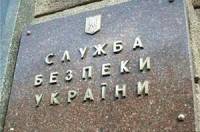Dismantled Lenin Monument makes Vasylkiv terrorist trial a farce

The verdict is awaited in the trial of three men charged, most bizarrely, with “terrorism” over an alleged plot to blow up a monument to Lenin. Problems in understanding how removal of a monument can be classified as terrorism are exacerbated by one further detail: the monument had already been dismantled which the men knew. There is also an intercepted phone call which indicates that the security service [SBU] knew that they knew.
Unfortunately, Ukrainian investigators and the courts are seldom daunted by such trivial obstacles, and the men have been held in custody now for well over 2 years.
Ihor Mosiychuk, Serhiy Bevz and Volodymyr Shpara are members of a far right organization “Patriot of Ukraine”. The first two were also deputies of the Vasylkiv Town Council. On Aug 22 2011 SBU officers burst into the office of a municipal enterprise where two of the men worked and carried out a search. They allegedly found a homemade explosive device and some leaflets, including one which refers to the monument, saying that it has been dismantled but that there are plans to erect it elsewhere. It expresses determination to eradicate all monuments to Ukraine’s totalitarian past. This leaflet, which the men assert was planted, ends somewhat unexpectedly with a threat to turn their “righteous anger” against the president, Viktor Yanukovych if he does not comply with their demands to totally destroy all monuments to the totalitarian past, and a call to “patriots” to unite in acts of disobedience and to learn about military and explosives issues.
Interestingly enough, even the SBU linguistic expert was not prepared to say that the leaflets contained any call to commit a terrorist act. Experts from the Kyiv National University, approached by the defendants’ lawyers, found neither calls to terrorism nor to overthrowing the constitutional order.
The key “evidence” is, however, the apparent bomb. Apparent since despite the claims that this was a dangerous explosive device, there is video footage of an SBU officer simply carrying it out of the office without, as is required, calling in explosives experts. The defence believes that the supposed explosive device was only the mould. It was later destroyed during an explosives examination, making it impossible to check whether it in fact contained explosives. That examination was carried out in secret with the defence not informed until after it had taken place – and been destroyed.
The mould itself did not hold the fingerprints or DNA traces of any of the defendants. There were other fingerprints however the investigators have not tried to find out who they belong to, claiming that this is no importance.
It can legitimately be asked what is of importance to them given a case so unashamedly absurd in its plot and weak on details. The main evidence has been destroyed, and the only real witness is a person with a criminal investigation hanging over him making him vulnerable to SBU pressure. Most importantly his testimony doesn’t add up. He has claimed that the defendants asked him for the money to buy the explosives and he refused three times. The amount and type of explosive powder allegedly contained in the device could be bought for around 100 UAH (10 EUR) making the defendants’ supposed request entirely incomprehensible.
Each man is facing an additional charge which their lawyers believe is in the event that the terrorist allegations can’t be made to stick. If the pistol which Mosiychuk is accused of having been in position of, or makes limited sense, the possession of narcotics in Shpara’s case makes none given the clean life principles of the men’s organization. The charges against Bevz, one of the Vasylkiv deputies, are in connection with leaflets which a disputed analysis found to contain “calls to overthrow the constitutional order”. The problems here are legion. The 200 leaflets which the men acknowledge to be bona fide were found in a hostel where Bevz, who has a wife and daughter, is only officially registered but does not reside. A person living in that hostel even stated immediately that the leaflets belonged to him.
If a leaflet produced by “Patriot of Ukraine” genuinely contains dangerous calls to overthrow the constitutional order, then the SBU should be seeking to prove this and take appropriate measures against the organization. Instead, a charge has been selectively laid against one individual who had no particular connection with the leaflet in question and did not live at the address where it was found.
The chief sticking point in this whole squalid case is, of course, Lenin. It is firstly true that the wish to see his monuments removed from squares in independent Ukraine is shared by very many Ukrainians who find “Patriot of Ukraine” ideology totally repugnant. Secondly, an attempt to dismantle a monument may stretch to vandalism, but can in no way be called an act of terrorism.
The third problem with this SBU foray into spy fiction is entirely insurmountable. There was no monument to Lenin, making the entire plot simply comical.
Three men have spent 2 years and 4 months in custody already and could face up to 9 years imprisonment if convicted of “terrorism”, in connection with an alleged plan to bomb a monument that had already been dismantled However much we may dislike the men’s views, the brazen determination to convict them with disregard for the law and sheer commonsense is a travesty of their right to a fair trial and a threat to each and every member of the public.





